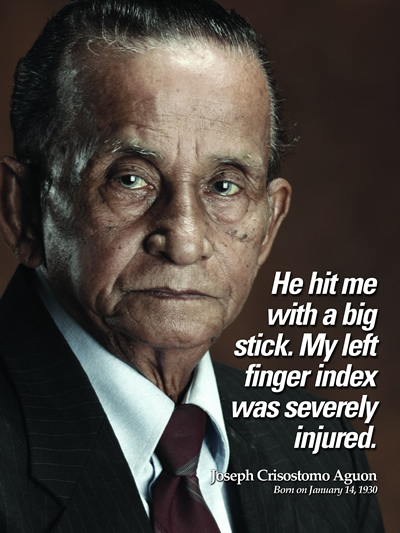 My name is Joe Crisostomo Aguon from Barrigada.
My name is Joe Crisostomo Aguon from Barrigada.
Father Roman told us that the people - - that the Japanese had bombed Sumay. We went home, and my parents were ready to leave our home in Agana for the ranch. I took my youngest brother, Tony, and he was only one year old. I carried him on my back to the ranch in Barrigada, where we stayed for (62) years, remained there in Barrigada for (62) years.
On December 10, the Japanese government ordered the people of Guam to obtain a pass to Agana. So I went to Agana with my parents, Mr. and Mrs. Juan S. Aguon, both deceased, and my brothers and sisters, Danny, Raymond, Eddie, Lola, Menang and Laling. I’ll mention all my brothers still alive at this time. To obtain this pass, this pass allowed you to travel throughout the island and without question.
Without this pass, you will be in trouble by the kempetai, those are the police. During this period of time, I and my other brothers and sisters, except the youngest one, Tony, who was only a baby at the time, attended a Japanese school in Mangilao which now we call Price Elementary School. In school, I was constantly slapped and kicked by my teacher, called sensei, for not bowing my head to the Emperor of Japan, Hirohito.
In late 1942, I was forced to work at the airport, now called Tiyan or NAS Agana. My job was to dig and sometimes carry water for the Japanese Soldiers. At the end of the day, we were getting a handful of rice as our payment. Later in the year, I was assigned to work in Canada, Barrigada as a mess boy. Again, I was transferred to work in Ordot digging tunnels. To dig tunnels, and if the Japanese were not satisfied, we were told to line up face-to-face and slap one another.
When my turn came, I refused to slap the old man facing me. I was hit by the Japanese guard holding a stick. The man whispered, go ahead and slap me. I will understand. In 1943, I was back working at the airfield base in NAS Agana, and in one occasion, I was at the job site watching the dog fight between the American airplanes and the Japanese.
I was caught by this Korean guard, called Choseng, at the job site, and he hit me with a stick, big stick. My left finger index was severely injured. The bone has healed up on my left index finger after many years later, but yet still, at the present time, I could not close my left index finger to make a fist.
The same year, I was riding on the back of a Japanese truck with a group of people to work at the airfield base when suddenly the two-by-four to which I was sitting in the back of the truck hit a tree and threw me 5 to 10 feet to the ground.
Returning home from work at the airfield base, three Japanese soldiers came to the house armed with rifles and took my father for questioning. My father was accused of hiding and feeding George Tweed, an American radioman, Navy, who took to the jungle rather than to surrender to the Japanese. My father, Juan Santos Aguon, as I understand, was beaten by the Japanese, by the kempetai.
In the early part of 1944, we were forced to march from our place in Barrigada to the concentration camp in Talafofo in Manenggon. We were all in constant fear for our lives knowing that the Japanese had killed some people in Merizo and other parts of the island and to massacre the people at the concentration camp here in Manenggon.
We stayed at the camp up until the American forces recaptured the island of Guam on July 21, 1944.
Real People. Real Stories. A weekly testimonial series provided by the Office of Senator Frank F. Blas, Jr.. The testimony of Joseph Aguon is recorded in the Guam War Claims Review Commission public hearing held in Hagåtña, Guam on December 8, 2003. This story sponsored by the community involvement of Cabras Marine Corporation. Photo courtesy of Expressions Studio.
 |
 |
